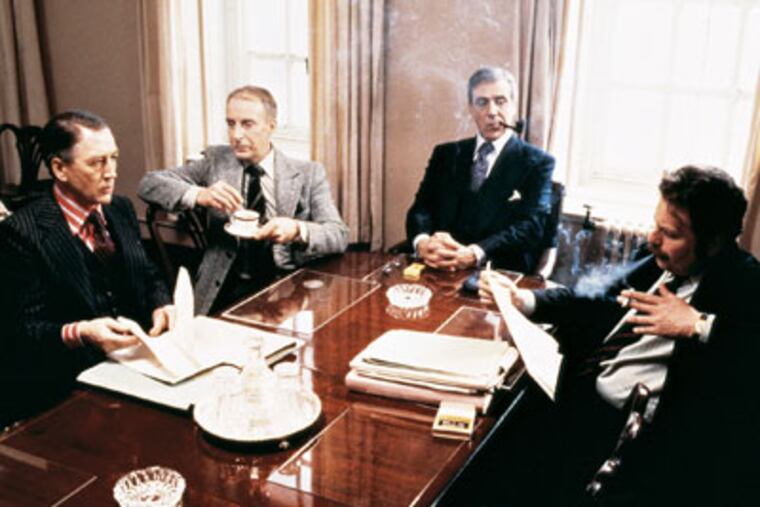Favorites of the films from novels by le Carré As a new "Tinker," with Gary Oldman, opens, check out the spy writer's worthy tales, all on DVD.
I've spent much of my reading life trying to figure it out: What is it about the work of John le Carré that draws me back to his books again and again?

I've spent much of my reading life trying to figure it out: What is it about the work of John le Carré that draws me back to his books again and again?
Le Carré (real name, David Cornwell), a former British spy turned best-selling novelist, is a master plotter - but so is Arthur Conan Doyle. He's a marvelous creator of dialogue - but so is Elmore Leonard. He is darkly hilarious in that dry, British manner - but so are any number of contemporary English novelists.
My humble conclusion: It's the themes of loyalty and betrayal at the core of le Carré's work that have made some of his stories tales for the ages. It's so human to want to belong heart and soul to something, whether it's a person, a family, an institution, or a country. Le Carré's novels portray the cost of letting loyalty blind you to the truth, and often the truth is very hard, indeed.
Most of le Carré's books have been made into movies. Skipping over the lesser productions (The Looking Glass War, The Little Drummer Girl), here's a short list of the best films and TV shows made from le Carré's books, all available on DVD. Not so coincidentally, most feature le Carré's George Smiley, a British bureaucrat in the spy service whose bland, bespectacled facade masks a passionate intellect, a broken heart, and a sixth sense for betrayal that eventually sees through every kind of deceit.
Will the new version of Tinker Tailor Soldier Spy, starring Gary Oldman, which opened Friday, earn a spot on this list of favorites?
The Spy Who Came in From the Cold (1965). I am old enough to remember the fuss when this movie came out - its bleak view of the spy trade shocked an American audience steeped in the West-good, Soviets-bad polemics of the Cold War.
Shot in black-and-white, Spy tells the story of a burned-out British spy, Alec Leamas, who is sent to East Germany to sow disinformation. But his entanglement with an idealistic young woman makes him begin to doubt the wisdom and morality of his mission. Richard Burton, a '60s heartthrob because of his affair with Elizabeth Taylor, showed his chops as an actor with his gritty, depressing, and thoroughly realistic portrayal of the tormented Leamas. George Smiley plays a secondary role as Leamas' handler.
Tinker Tailor Soldier Spy (1979). This six-episode miniseries, made for the BBC, has been hailed by many as some of the best television ever made. The expanded format allowed a full exposition of le Carré's labyrinthine plot.
Based on the first book of le Carré's Karla trilogy, Tinker features the incomparable Alec Guinness as Smiley, who is brought back out of forced retirement and charged with ferreting out a mole in British intelligence. As Smiley investigates, he confronts the service's moral and strategic failures and finds his own loyalties shaken to the core.
In a 1999 appearance, le Carré said that Guinness' Smiley entered his head and wouldn't leave: "I had my character stolen by Alec Guinness. His voice and mannerisms entered my soul - to the extent that I didn't know if I could finish the trilogy."
Smiley's People (1982). The third book in le Carré's Karla trilogy (after The Honourable Schoolboy) became another BBC miniseries (six episodes). It again starred Guinness and concludes the titanic struggle between Smiley and Karla, his archenemy in East German intelligence, who ran the British mole and seemed to know Smiley better than he knew himself. Patrick Stewart has a brief but unforgettable nonspeaking scene as Karla.
A Perfect Spy (1987). The BBC miniseries version of le Carré's finest novel after Tinker is almost as devastating as the 1986 novel. When it came out, Philip Roth called it "the best English novel since the war." The seven-episode series portrays the disintegration of Magnus Pym, a British spy recruited by Axel, a Czech student he met (and betrayed) as a young man. Axel has become an operative in Czech intelligence (at that point, Czechoslovakia was a Soviet puppet regime) and enlists Magnus as a double agent, to spy on his own country.
Magnus' character and moral compass have been forever distorted by his relationship with his con-man father. The relationship between the spy Pym and his scoundrel father, Rick Pym, is highly autobiographical - le Carré's father was a confidence man whose escapades had a profound impact on le Carré's upbringing and outlook. Peter Egan stars as Magnus, and le Carré had a hand in the screenplay.
A Murder of Quality (1991). I recently rediscovered this adaptation of le Carré's second novel. Though he doesn't quite approach the gravitas of Alec Guinness' characterization, Denholm Elliott is still marvelous as Smiley, a self-effacing little man and the butt of jokes about his wife's unfaithfulness, whose bland exterior masks a dogged determination to get to the bottom of things.
When Smiley is asked by a friend to investigate the death of a faculty wife at Carne, a boy's prep school, he digs into a pile of class conflict, blackmail, and town vs. gown resentment. Le Carré wrote the screenplay, and a young Christian Bale plays a prep-school student who knows more than he ought to.